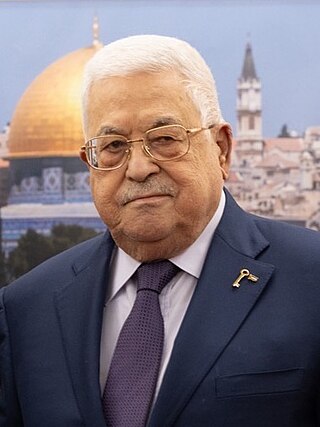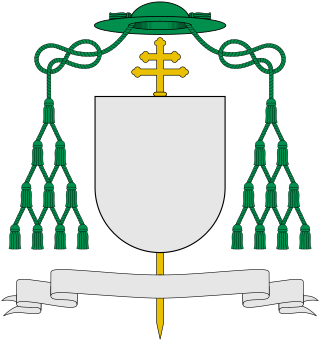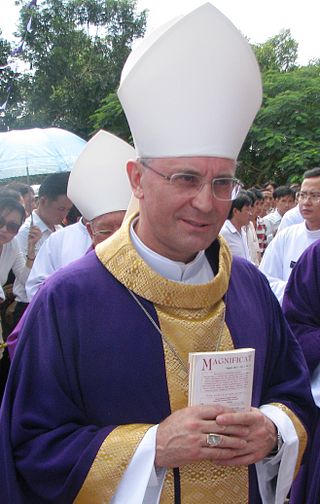
Mahmoud Abbas, also known by the kunya Abu Mazen, is a Palestinian politician who is the president of the State of Palestine and the Palestinian National Authority (PNA). He has been the chairman of the Palestine Liberation Organization (PLO) since 2004, PNA president since January 2005, and State of Palestine president since May 2005. Abbas is also a member of the Fatah party and was elected chairman in 2009.

Pietro Sambi was an Italian prelate of the Catholic Church who served in the diplomatic service of the Holy See from 1969 until his death in 2011. He had the rank of archbishop and the title of nuncio from 1985, fulfilling assignments in Burundi, Indonesia, Cyprus, Israel, Jerusalem and Palestine, and the United States.

The Catholic Church in Israel is part of the worldwide Catholic Church, in full communion with the Holy See in Rome.

Giuseppe Lazzarotto KC*HS is an Italian prelate of the Catholic Church who worked in the diplomatic service of the Holy See from 1971 to 2017, with the rank of apostolic nuncio and an archbishop since 1994.

The Islamic Republic of Iran officially recognises Palestine as a state. Ali Khamenei, the Supreme Leader of Iran, rejects a two-state solution and implies that Palestine is inseparable, while Iran's former President Mahmoud Ahmadinejad called for a free referendum for the entire Palestinian population, including Arab citizens of Israel, to determine the type of government in the future Palestinian State, while reiterating that establishment of a Palestinian State alongside Israel would "never mean an endorsement of the Israeli occupation".

Dominique François Joseph Mamberti is a French prelate of the Roman Catholic Church and the Prefect of the Apostolic Signatura in the Roman Curia. He was elevated to the rank of cardinal by Pope Francis in 2015.
The Holy See has long been recognised as a subject of international law and as an active participant in international relations. It is distinct from the city-state of the Vatican City, over which the Holy See has "full ownership, exclusive dominion, and sovereign authority and jurisdiction".

Diplomatic relations between the Holy See and the State of Israel, as well as a concordat defining the status and fiscal and property rights of the Catholic Church and related entities within Israel. Formal diplomatic relations between the two states were established after the adoption of the Fundamental Agreement by the two States on 30 December 1993. A Vatican Nunciature in Israel and an Israeli embassy in Rome were simultaneously opened on 19 January 1994. From the Vatican's point of view, the establishment of diplomatic relations between the two states is part of the Christian–Jewish reconciliation; and from the Israeli point of view, the normalization of diplomatic relations. Prior to the establishment of diplomatic relations, the interests of the Catholic Church in Israel were looked after by the Apostolic Delegate to Jerusalem and Palestine, the Latin Patriarch of Jerusalem and the Custodian of the Holy Land, all of which continue to function.

Paul Richard Gallagher, is a British prelate of the Catholic Church who has been Secretary for Relations with States within the Holy See's Secretariat of State since November 2014. He has worked in the diplomatic service of the Holy See since 1984 and has held the rank of archbishop and apostolic nuncio since 2004, serving as nuncio in Burundi, Guatemala, and Australia.

Antonio Franco is a Vatican diplomat.

The Apostolic Nunciature to Israel is the nunciature of the Holy See to Israel. The head of the nunciature is the Apostolic Nuncio to Israel, who is the holder of a diplomatic position within the Holy See and acts as nuncio (ambassador) of the Holy See to Israel. The office's work takes place in the broader backdrop of Holy See–Israel relations that have evolved considerably since 1994.

Adolfo Tito Camacho Yllana is a Philippine prelate of the Catholic Church who works in the diplomatic service of the Holy See. He has been an archbishop and apostolic nuncio since 2001, the Apostolic Nuncio to Israel as well as Apostolic Delegate to Jerusalem and Palestine since June 2021.

China–Palestine relations, also referred to as Sino–Palestinian relations, encompass the long bilateral relationship between China and Palestine dating back from the early years of the Cold War.

Political relations between the State of Palestine and the United States have been complex and strained since the 1960s. While the U.S. does not recognize the State of Palestine, it recognizes the Palestine Liberation Organization (PLO) as the legitimate representative entity for the Palestinian people; following the Oslo Accords, it recognized the Palestinian National Authority as the legitimate Palestinian government of the Palestinian territories.

Leopoldo Girelli is an Italian prelate of the Catholic Church who serves as the apostolic nuncio to India and Nepal. He was nuncio to Israel and Cyprus as well as apostolic delegate to Jerusalem and Palestine from 2017 to 2021. He has worked in the diplomatic service of the Holy See since 1987 and previously served as nuncio to Indonesia, East Timor, and Singapore.

Antoine Camilleri is a Maltese prelate of the Catholic Church who served as the Under-Secretary for Relations with States in the Secretariat of State of the Holy See, until he was named an archbishop and given the title of apostolic nuncio in 2019. He joined the diplomatic service of the Holy See in 1999.
The president of the Palestinian National Authority is the highest-ranking political position in the Palestinian National Authority (PNA). From 2003 to 2013, the president appointed the prime minister of the Palestinian National Authority, who normally required approval of the Palestinian Legislative Council, and who shares executive and administrative power with the president. In 2013 that position was abolished and substituted by the Prime Minister of the State of Palestine position.

The Holy Family Church of Gaza City is the only Catholic church in the Gaza Strip, State of Palestine.

Pierbattista Pizzaballa is an Italian Catholic prelate who has served as Latin Patriarch of Jerusalem since 6 November 2020. A Franciscan friar, he served as Custos of the Holy Land from 2004 to 2016 and as Apostolic Administrator of the Latin Patriarchate from 2016 to 2020. He was made a cardinal by Pope Francis in 2023.
The Comprehensive Agreement between the Holy See and the State of Palestine is an agreement signed on 26 June 2015 between the Holy See and the Palestine Authority, representing the State of Palestine, through which the Holy See recognized the State of Palestine as an independent state and established diplomatic relations with it.



















